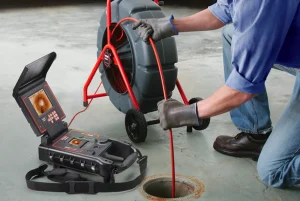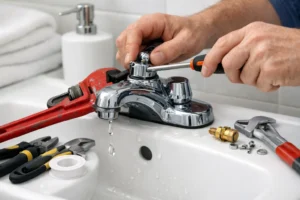|
Getting your Trinity Audio player ready...
|
Considering a tankless water heater? You’re likely looking at long-term energy savings and endless hot water. But are these benefits worth the initial investment and potential installation challenges? This guide breaks down everything you need to know, from how tankless heaters work to their maintenance requirements, helping you decide if one is right for your home.
A tankless water heater heats water only when you need it—unlike conventional systems that store hot water in a tank 24/7. This innovative design eliminates standby heat loss, offering an eco-friendly and cost-effective solution for homeowners.
What is a tankless water heater and how does it work
To understand how does a tankless water heater work, it’s important to know how they differ from traditional water heaters that store water. Standard water heaters keep a large tank of water hot all the time. Tankless water heaters only heat water when you turn on a hot water tap. This eliminates the energy waste of keeping a tank of water hot when you’re not using it.
How Does It Work?
When you turn on the hot water tap, cold water travels through a pipe into the unit. A gas burner or electric element heats the water instantly, delivering a constant stream without the need for a storage tank. Because it operates only when needed, this system is highly energy-efficient and minimizes water waste.
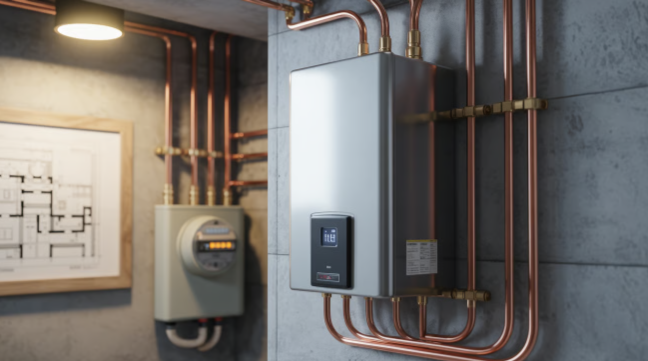
The process is efficient. When you turn on the hot water, cold water flows into the tankless unit. Inside, either a gas burner or electric coil quickly heats the water as it passes through a heat exchanger. Sensors monitor the water flow and adjust the heat to keep the water temperature consistent.
This tankless vs traditional water heater comparison shows a key benefit: you get hot water as long as you need it, without waiting for a tank to refill. Traditional systems can run out of hot water, but tankless systems provide a continuous supply as long as you don’t exceed the unit’s capacity. This system responds to your household’s hot water demands in real time.
Now that you understand the basic mechanics, let’s weigh the advantages and disadvantages of switching to a tankless system.
Pros and cons of tankless hot water heaters
The tankless water heater pros are making them a popular choice for homeowners who want to save space and energy. One of the main tankless water heater advantages is that they don’t waste energy heating water when you don’t need it. For homes that use 41 gallons of hot water or less per day, a tankless system can be 24-34% more energy efficient than a traditional tank. Even larger households that use around 86 gallons of water daily can still save 8-14% on energy costs.
Tankless units are also compact and mount on walls, which saves floor space. This can be a big plus in smaller homes or utility rooms. Plus, they can last for 20 years or more, which is about twice as long as a traditional tank heater.
If sized correctly, tankless systems provide hot water whenever you need it. You won’t have to worry about running out of hot water in the middle of a shower or while running multiple appliances.
However, there are potential drawbacks to consider before investing in a tankless system. The initial cost can be higher than traditional systems, with purchase and installation sometimes costing $3,000 or more. The installation may also require upgrades to your electrical system, gas lines, or venting, which can add to the expense.
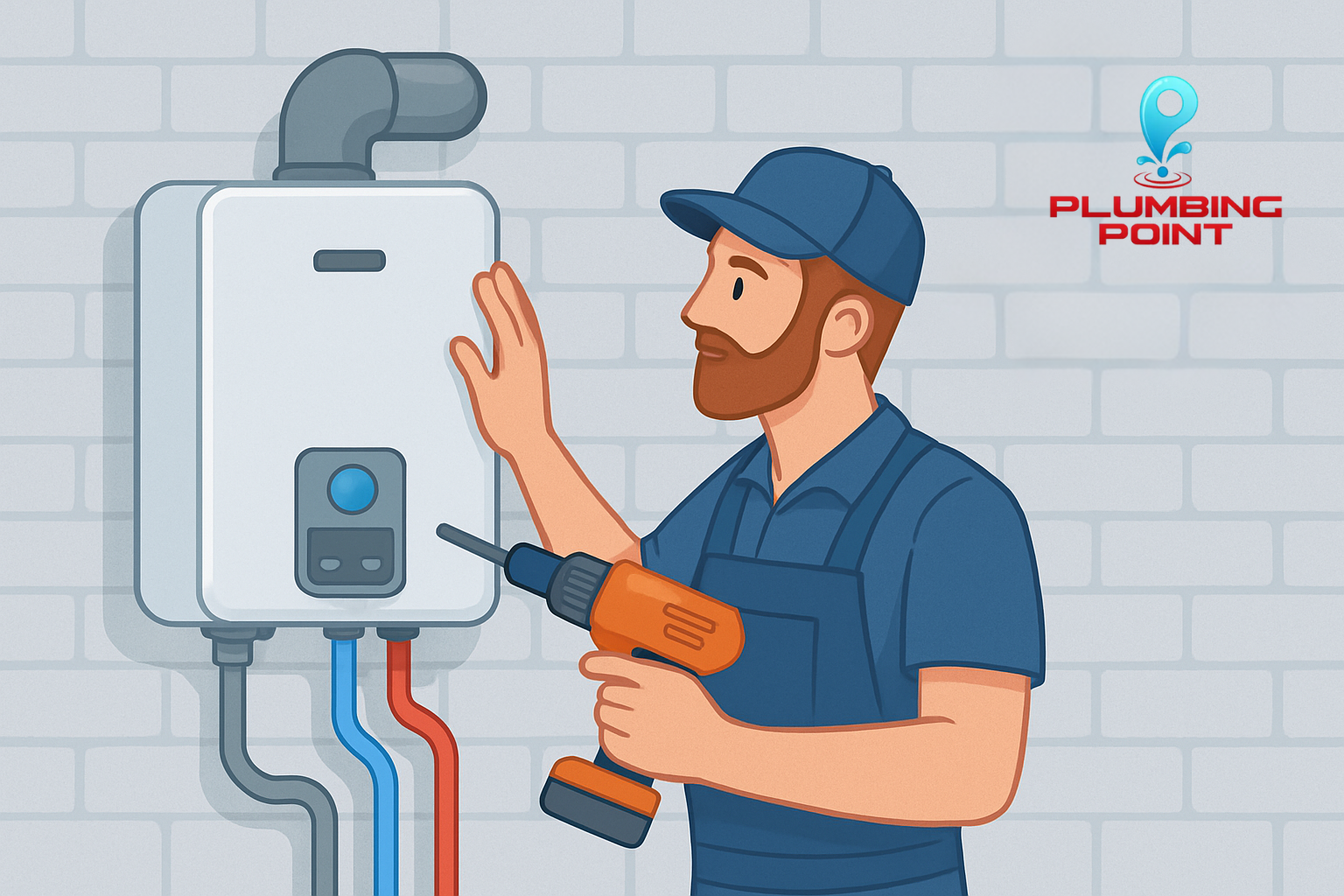
Tankless systems can only heat a certain amount of water per minute. If you use too much hot water at once, such as running the dishwasher while someone is showering, the water temperature or pressure may drop. In some cases, you might need to install multiple units to handle peak demand, which can increase the overall cost.
Given these trade-offs, how do tankless heaters stack up in terms of energy efficiency and potential cost savings?
Energy efficiency and cost savings of tankless water heaters
The tankless water heater energy efficiency comes from heating water only when you need it. Traditional water heaters constantly heat water in a tank, which wastes energy. This standby heat loss can account for 10-20% of your annual water heating costs. Whether a tankless water heater will save money depends on how much hot water you use and the cost of energy in your area.
Tankless water heater energy savings can be significant. Homes that use less hot water see the biggest savings, with efficiency gains of 24-34% for households using 41 gallons or less per day. Even homes that use a lot of hot water can still save 8-14%, which can lower your monthly utility bills over time.
The potential tankless water heater cost savings include lower energy bills, a longer lifespan for the unit, and possible rebates or tax credits. Many utility companies offer rebates for installing high-efficiency tankless water heaters, and you may also be eligible for federal tax credits if you purchase an Energy Star model.
Your location can also affect how much you save. If you live in a warm climate, the incoming water temperature will be higher, so it takes less energy to heat the water. If you live in a colder area, the groundwater temperature will be lower, which could reduce your savings, but you’ll still likely save money compared to a traditional system.
Before you can enjoy these savings, you’ll need to navigate the installation process. Here’s what to expect.
Tankless water heater installation process and considerations
Tankless water heater installation is more involved than replacing a standard water heater. Before you decide should i get a tankless water heater, you need to assess whether your home’s current setup can handle the demands of the new system.
Gas tankless heaters typically need larger gas lines than standard water heaters because they use more gas when operating. You might need to upgrade your gas line to ensure it can supply enough fuel. Tankless units also require different venting systems than traditional heaters.
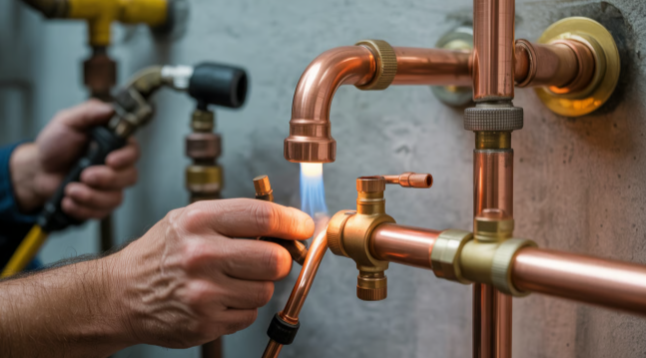
Electric tankless systems also have their own installation challenges. They require a lot of electricity, often 100-200 amps, which might be more than your home’s electrical system can handle. Upgrading your electrical panel and adding new circuits can significantly increase the cost of installation.
It’s best to have a professional install your tankless water heater to ensure it meets local building codes and the manufacturer’s instructions. The process includes removing the old system, modifying the utility connections, mounting the new unit, connecting the water lines, and testing the system. Proper installation is important for safety, efficiency, and to keep your warranty valid.
When considering are tankless water heaters worth it, factor in the total cost of installation, including any necessary upgrades. While it’s a significant investment, professional installation will help you get the most out of your system and ensure it lasts for years to come. Trying to install it yourself can be dangerous, violate building codes, and void the warranty.
Once installed, tankless water heaters require regular maintenance to keep them running smoothly. Let’s explore those requirements.
Maintenance requirements for tankless water heaters
Regular tankless water heater maintenance is key to maximizing its tankless water heater lifespan and keeping it running efficiently. Unlike traditional tank systems, which mainly need occasional flushing, tankless units need more frequent attention to prevent mineral buildup.
Descaling is the most important maintenance task, especially if you have hard water. Minerals can build up in the heat exchanger over time, which reduces efficiency and can cause damage. Descaling involves circulating a vinegar or commercial descaling solution through the system for about an hour, followed by flushing it with clean water.
Cleaning or replacing the filter is also important. Most tankless units have inlet water filters that catch sediment and debris before they reach the heat exchanger. Depending on your water quality, you may need to clean these filters every few months or replace them once a year.
Low Maintenance Requirements
Compared to tank systems, tankless heaters require less frequent maintenance, but some upkeep is still essential to ensure peak performance.
Annual Descaling or Flushing
Mineral buildup, especially in hard water areas, can impact efficiency. An annual descaling or flushing removes calcium deposits and prevents damage.
Cleaning Filters
Most units have water and air filters that need occasional cleaning or replacement—typically every 6–12 months depending on usage.
Professional Inspections
It’s wise to have a professional inspect the system annually to check for gas line issues, burner function, and ensure no vent blockages.
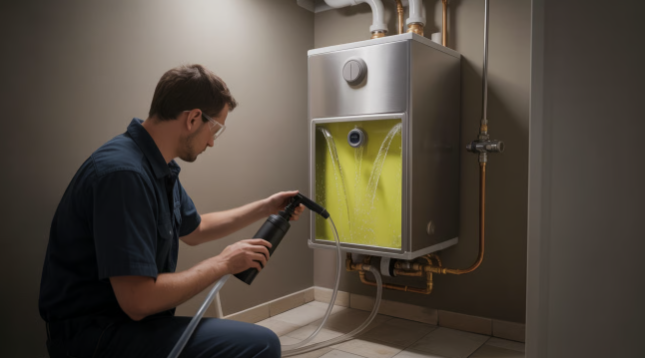
Having a professional inspect your system every two to three years can help catch potential problems early. A qualified technician can check the heat exchanger, venting, gas connections, and safety systems. This can help you get the full 20-year tankless water heater lifespan and maintain your warranty.
With all these factors in mind, how do you determine if a tankless water heater is the right choice for your home?
Is a tankless water heater right for your home
Deciding if a tankless system is right for you involves more than just considering the benefit of tankless water heater systems. How your family uses hot water is a major factor. If you have consistent, moderate hot water needs, you’ll likely see the most benefits. However, if you often use a lot of hot water at the same time, you might need multiple units or find that a traditional system is more practical.
Think about your home’s layout when weighing the advantages and disadvantages of tankless water heaters. If you have limited space, a tankless system’s compact design can be a big advantage. Also, your local climate can affect performance. If you live in a cold region, it will take more energy to heat the incoming water, which could reduce your energy savings.
Consider the initial cost, installation expenses, potential upgrades, and ongoing maintenance costs. While tankless systems can save you money in the long run, the upfront investment can be a barrier for some homeowners. Knowing why avoid a tankless water heater might be the right choice for you can help you make a well-informed decision.
Finally, think about how much maintenance you’re willing to handle. Tankless systems require more upkeep than traditional tanks. If you prefer a simple, low-maintenance solution, a traditional system might be a better fit, even though it’s less efficient and has a shorter lifespan. Understanding the signs your water heater needs repair or replacement can also help you make an informed decision about upgrading.
Making the Switch
Ultimately, the decision to switch to a tankless water heater hinges on balancing long-term savings with upfront costs and lifestyle considerations. Assess your hot water usage, consider potential installation challenges, and weigh the maintenance requirements. If you value energy efficiency, have moderate hot water needs, and are prepared for the initial investment, a tankless system could be a smart move. Start by getting quotes from qualified plumbers to evaluate your home’s specific needs and ensure a seamless transition to on-demand hot water. And for any unexpected issues or urgent plumbing concerns, it’s good to know that emergency plumbers are available 24/7.
People Also Asked Questions (FAQs)
What are the primary tankless water heater pros?
Energy efficiency, endless hot water, compact design, and longer lifespan are the key benefits of tankless water heaters.
How long does a tankless water heater last?
With proper maintenance, tankless water heaters can last over 20 years—significantly longer than traditional units.
Is installation expensive for a tankless water heater?
Installation can cost between $1,000–$3,000, depending on the model, home size, and required upgrades.
Do tankless water heaters require maintenance?
Yes, but less frequently than traditional models. Annual flushing and occasional filter cleaning are generally sufficient.
Can I install a tankless water heater myself?
DIY installation is not recommended. It involves plumbing and electrical or gas work, which is best handled by professionals.
Do tankless water heaters save money?
Absolutely. Though the upfront cost is higher, lower energy bills and fewer replacements result in long-term savings.

